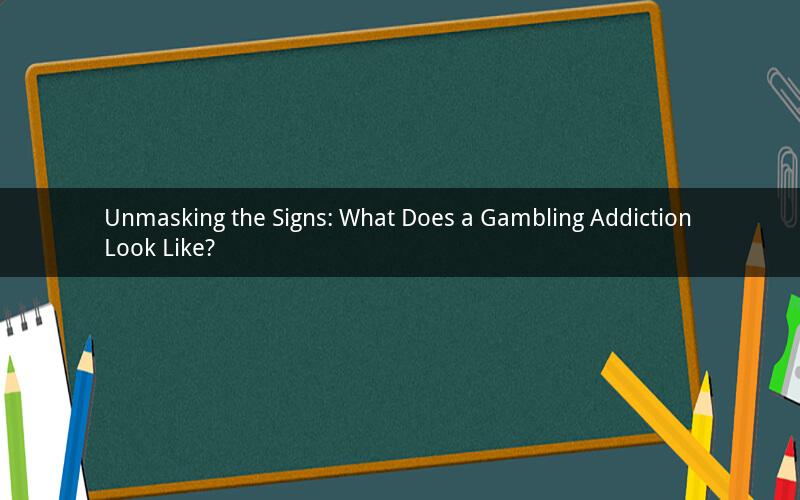
Gambling addiction, often referred to as compulsive gambling, is a condition where an individual experiences a uncontrollable urge to gamble, despite negative consequences. Recognizing the signs of gambling addiction is crucial in addressing and treating this disorder. This article delves into the telltale signs and symptoms that may indicate a gambling addiction, providing insights into the behaviors and emotional patterns typically associated with this condition.
Signs of a Gambling Addiction
1. Preoccupation with Gambling
One of the first signs of a gambling addiction is an increasing preoccupation with gambling. This may manifest in various ways, such as:
- Constantly thinking about gambling, even when not actively engaging in it.
- Making plans around gambling activities, such as arranging travel or setting aside specific times for gaming sessions.
- Experiencing a heightened sense of anxiety or discomfort when unable to gamble.
2. Inability to Control Gambling Behavior
As a gambling addiction progresses, individuals may find it increasingly difficult to control their gambling behavior. This may include:
- Repeatedly trying to stop or control gambling but failing to do so.
- Engaging in risky or excessive gambling to satisfy the craving, despite the potential negative consequences.
- Spending more time and money on gambling than originally intended.
3. Emotional and Behavioral Changes
Gambling addiction can significantly impact an individual's emotional and behavioral well-being. Common changes may include:
- Becoming increasingly secretive or defensive about gambling activities.
- Experiencing mood swings, such as irritability, frustration, or depression when not gambling.
- Isolating oneself from friends and family, as well as neglecting responsibilities at work or school.
4. Financial Consequences
Gambling addiction often leads to significant financial difficulties. Signs of financial problems may include:
- Borrowing money to fund gambling activities, often resulting in overwhelming debt.
- Missing bill payments, which may lead to late fees or legal action.
- Selling personal belongings or taking on risky investments to obtain gambling funds.
5. Health and Physical Symptoms
Gambling addiction can also have adverse effects on an individual's physical health. Some of the common symptoms may include:
- Insomnia or sleep disturbances due to preoccupation with gambling.
- Fatigue or loss of energy, which may be a result of spending long hours gambling or worrying about gambling.
- Headaches or other physical discomforts related to stress and anxiety.
6. Relationship Struggles
Gambling addiction can strain relationships with loved ones. Signs of relationship difficulties may include:
- Arguments and conflicts with family members or partners due to gambling-related issues.
- Isolation from friends and family as a result of secrecy or gambling-related activities.
- Divorce or separation, particularly when gambling affects one's ability to maintain a healthy relationship.
Questions and Answers
1. Can someone with a gambling addiction still enjoy gambling without becoming addicted?
Answer: While it's possible for some individuals to enjoy gambling without developing an addiction, it largely depends on their ability to maintain control over their gambling behavior. Those who are prone to addictive tendencies or who have a family history of addiction may need to be more vigilant in monitoring their gambling activities.
2. Is there a difference between problem gambling and a gambling addiction?
Answer: Yes, there is a difference between problem gambling and a gambling addiction. Problem gambling refers to any gambling behavior that causes distress or harm, while a gambling addiction is a more severe form of problem gambling characterized by a strong urge to gamble and a loss of control over gambling behavior.
3. How can someone identify if they or a loved one has a gambling addiction?
Answer: Identifying a gambling addiction involves looking for signs such as preoccupation with gambling, difficulty controlling gambling behavior, emotional and behavioral changes, financial difficulties, health issues, and strained relationships.
4. Can therapy help someone overcome a gambling addiction?
Answer: Yes, therapy can be a highly effective tool in helping individuals overcome a gambling addiction. Various treatment approaches, such as cognitive-behavioral therapy (CBT) and motivational interviewing, can help individuals develop healthier gambling behaviors and address underlying issues contributing to their addiction.
5. Are there any support groups available for individuals struggling with a gambling addiction?
Answer: Yes, there are numerous support groups available for individuals struggling with a gambling addiction. Organizations such as Gamblers Anonymous and Gam-Anon offer peer support, resources, and assistance in overcoming this challenging condition.
Understanding the signs and symptoms of a gambling addiction is crucial in recognizing and addressing this disorder. By becoming aware of the warning signs, individuals can seek help and take steps towards recovery. Don't hesitate to reach out for support if you or someone you know is struggling with a gambling addiction.